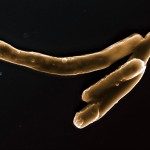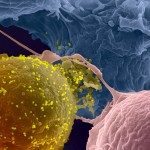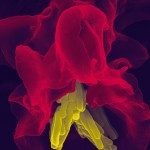Link to Pubmed [PMID] – 16279841
PLoS Med. 2005 Dec;2(12):e381
BACKGROUND: Interplays between Mycobacterium tuberculosis, the etiological agent of tuberculosis (TB) in human and host professional phagocytes, namely macrophages (Mphis) and dendritic cells (DCs), are central to immune protection against TB and to TB pathogenesis. We and others have recently shown that the C-type lectin dendritic cell-specific intercellular adhesion molecule-3 grabbing nonintegrin (DC-SIGN; CD209) mediates important interactions between mycobacteria and human monocyte-derived DCs (MoDCs) in vitro.
METHODS AND FINDINGS: In order to explore the possible role of DC-SIGN in M. tuberculosis infection in vivo, we have analysed DC-SIGN expression in broncho-alveolar lavage (BAL) cells from patients with TB (n = 40) or with other non-mycobacterial lung pathologies, namely asthma (n = 14) and sarcoidosis (n = 11), as well as from control individuals (n = 9). We show that in patients with TB, up to 70% of alveolar Mphis express DC-SIGN. By contrast, the lectin is barely detected in alveolar Mphis from all other individuals. Flow cytometry, RT-PCR, and enzyme-linked immunosorbent assay analyses of BAL-derived fluids and cells indicated that M. tuberculosis infection induces DC-SIGN expression in alveolar Mphis by a mechanism that is independent of Toll-like receptor-4, interleukin (IL)-4, and IL-13. This mechanism most likely relies on the secretion of soluble host and/or mycobacterial factors that have yet to be identified, as both infected and uninfected bystander Mphis were found to express DC-SIGN in the presence of M. tuberculosis. Immunohistochemical examination of lung biopsy samples from patients with TB showed that the bacilli concentrate in pulmonary regions enriched in DC-SIGN-expressing alveolar Mphis in vivo. Ex vivo binding and inhibition of binding experiments further revealed that DC-SIGN-expressing alveolar Mphis constitute preferential target cells for M. tuberculosis, as compared to their DC-SIGN- counterparts. In contrast with what has been reported previously in MoDCs in vitro, ex vivo DC-SIGN ligation by mycobacterial products failed to induce IL-10 secretion by alveolar Mphis, and IL-10 was not detected in BALs from patients with TB.
CONCLUSION: Altogether, our results provide further evidence for an important role of DC-SIGN during TB in humans. DC-SIGN induction in alveolar Mphis may have important consequences on lung colonization by the tubercle bacillus, and on pulmonary inflammatory and immune responses in the infected host.



